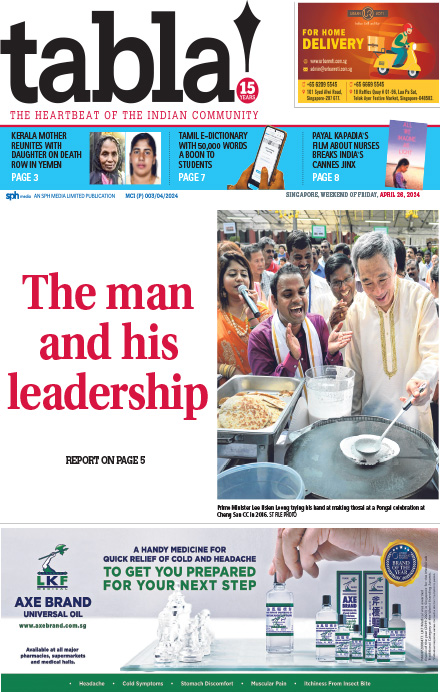Residents in Mountbatten were treated to a four-hour programme of Indian culture and traditions during the Indian New Year celebrations at Katong Community Centre on April 6.
Organised by the community club’s Indian Activity Executive Committee (IAEC), the Flavours of India event involved music, dance, fashion and food.
It was a learning occasion for non-Indians while the different Indian communities gathered to celebrate the Solar New Year.
The Solar calendar is believed to have originated in the Indian subcontinent some 3,500 years ago.
Based on it, communities in Singapore, India, Sri Lanka, Nepal, Myanmar, Thailand, Laos, Cambodia and southern China usher in the Solar New Year between April 13 and 16 every year. It is the first day of the solar cycle year, when the sun transits from Pisces to Aries.
The festivals associated with the Solar New Year include Tamil Puthandu (April 14), Punjabi Vaisakhi (April 13), Assamese Rongali Bihu (April 14-20), The Telugu and Kannada Ugadi (April 9) Malayalee Vishu (April 14), Bengali Pohela Boishakh (April 14), Thai Songkran (April 13-15) and Myanmarese Thingyan (April 13-16).
Twenty-two Indian associations participated in the new year celebrations. These included the Kashmir Association, Northeast Indian Association of Singapore, Maharashtra Mandal Singapore, Singapore Malayalee Association, Meyer Tamil Sangam, Bengali Association Singapore, Singapore Indian Development Association and Indian Women’s Association.
More than 500 residents and guests enjoyed the performances, which included dances and songs from different Indian states and regions.
“Mountbatten CC is uniquely positioned to organise such an extravagant event because people from all Indian states reside in the area,” said Mr S. Venkita Padmanabhan, vice-chairman, Mountbatten IAEC.
“Last year, our celebrations were focused on giving the residents a taste of the different crafts from the Indian states. This year, the main intention was to give them a taste of the cuisines from the various regions of India.”
To that end, there were items such as momo, thukpa and phagshapa, which are popular in Sikkim; rabri, khadi and arsa, particular to Uttarakhand; Kashmiri traditional drink kehwa; and pazham pori and payasam from Kerala.
“I was very surprised to see that the momos are similar to the dumplings in our Chinese culture,” said Ms Tricia Lee, a resident.
“The food from the different parts of India tasted wonderful. The event opened my eyes to what Indian culture is all about and widened my perspective of the country’s traditions.”
Ms Lily Teo, 55, another resident, said: “There were different dances and a unique fashion show. I got to know a lot about the rich cultural heritage of India.”
Mountbatten IAEC’s chairperson Aarti Naidu said the programme was carefully put together after considerable deliberations.
“We did not want it to be all about Bollywood and film music,” she said. “Each Indian state has its own culture and traditions, all of which most Indians living in Singapore have not experienced because usually they visit only the places they are connected to.
“Our idea was to bring the different Indian communities in Singapore together and give people a chance to know and learn about what each Indian state has to offer.”
The music segment, titled Songs of Swadesh, and performed by Ambar Ghosh and his group Artist to Artist, was a medley of traditional Indian songs which made many residents and guests take to the floor. The dances too were of a wide variety, ranging from kathak to kuchipudi.
The grand finale was a ramp walk by members of the all-women Kamala Club, which was established in 1950.
Residents too joined in the showcasing of ethnic weaves from all the 28 Indian states, ranging from Kashmir to Kerala.
“One of the participants dressed as Chola warrior princess Kundavai, while another wore a dress from the Hmar community in Manipur,” said Kamala Club’s president Padmaja Yerramsetty.
“We also had Malay and Chinese friends volunteering to wear saris that had Kashmir’s kashida embroidery, Kerala’s kasvau (fine threads of gold or silver used in handloom weaves), Bengal’s jamdani (a fine muslin on which decorative motifs are woven using a loom) and Gujarat’s arjak (designs made using block printing).”
Guest-of-honour Lim Biow Chuan, MP and adviser to Mountbatten GROs, was impressed.
“It is important to celebrate the Indian New Year because we are in a multiracial country,” he said.
“Our IAEC invited different Indian societies to showcase their tradition, culture, food and dances. Many of the Chinese residents also came to learn more about the rich cultural heritage of India.
“It was a good opportunity to build racial harmony among our different races.”
The Kashmir Association’s Pramila Gurtoo said the grassroots event “gave our community a platform to showcase our culture in front of a broader and diverse audience”.
“For many people this was the first time they heard about our community, and we are glad we were able to make our presence visible along with other communities in an impactful manner,” she said.
“The biggest benefices of these events are the youth and kids who get a first-hand view of other communities, grow appreciation for their roots and learn to co-exist in our multicultural society.”
The Uttarakhand Association of Singapore’s president Harish Pant said: “We not only celebrated the spirit of unity in diversity but also promoted cultural understanding and appreciation among all attendees.
“Through our participation, we aimed to contribute to the vibrant tapestry of Singapore’s multicultural society, fostering a sense of belonging and inclusivity among all.”

“Each Indian state has its own culture and traditions, all of which most Indians living in Singapore have not experienced because usually they visit only the places they are connected to.”



